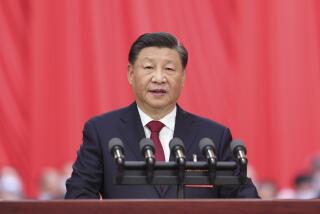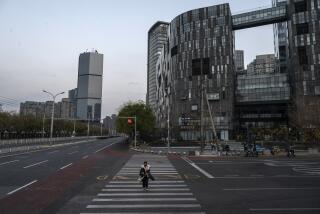China Faces a Lengthy Road to Prosperity
- Share via
PEKING — The big challenge for China is not how to develop its natural resources and build its transportation and communication facilities but rather how to harness its people.
“Harness” not in the sense of “control.” There’s been too much of that for far too long. That is the problem. Somehow what must be restored is a sense that getting ahead through hard work is OK, that intellectual talent is highly valued--in short, that it is just fine to possess the human spirit.
In the years preceding 1979, all that was not only frowned on but dealt with severely. A government official contends that it was so unnatural that change will come fast. But clearly, the government is worried enough to print front-page stories in its newspapers extolling the virtues of what is called “specialized households,” a euphemism for those with special talent and deserving of greater wealth.
The effects of the spirit-deadening policies of the past cannot be willed away overnight. There’s the case of the metalworking shop that officials said was closed at 11:30 a.m. because its production quota for the day was already met. Or the store clerks who all too commonly will serve you only when you insist they do so, a sharp contrast with Japan, South Korea and Taiwan.
It is the view of some here that the successes of those other nations so close to China are more responsible for the change in economic policies sweeping China these days than any other internal or external pressures. Simple embarrassment on the part of the regime, perhaps.
A Long Process
Catching up after 30 years of letting the others get a head start will be a long process, even with the breadth of reform under way. But with a billion people, even operating at half speed, a modicum of good management will make this populace tremendously productive. That means getting a lot of bureaucracy out of the way.
Right now, the bureaucracy is learning by trial and error. It freed the price of vegetables in Peking only to discover that city officials had long had a practice of keeping produce from outside the immediate area from coming into the city. Hence, higher prices weren’t attracting the anticipated supplies. For a time, there were television sets in the stores, but clearly China isn’t ready to waste restricted foreign reserves on importing equipment to make TVs. Power plants maybe, but not TVs.
Still, there are signs of prosperity, particularly outside the city. Reforms began earlier in the countryside and a drive reveals rural communities with almost entirely new homes. Many of the bicycles on the streets in Peking--private cars are rare--appear to be new. Western fashion is spreading.
Life, however, is still harsh in many ways. An elderly professor, stripped of his title and belongings and sent away to the country during the Cultural Revolution, is back at his university, much in demand. But his home has been a fourth-floor walk-up apartment with one small bedroom-sized living area and a tiny kitchen and bath with no tub or hot water. Only this month is he getting a long-promised slightly larger unit.
Life Improving
He’s not complaining. Some of his and his wife’s belongings have been returned and life, compared with the past, is much better.
In the department stores, display counters are filled, but often with one item, such as the same hair dryer or toy. Selection is minimal.
It is important to judge the nation not just on how far it has to go but also on how far it has come in a half-dozen years. But in doing so, American business interests would be wrong to believe China is on the verge of capitalism, or that spectacular profits await anyone who comes. It took 20 years for Japan to reach the point of massive consumer spending power--and the Japanese still spend carefully. A lot of money can be lost waiting for China to reach that point.
There is risk, too, in the durability of the recent reforms. It is not so much what the next generation of Communist Party leaders might do, but what will happen if there is a major economic setback, like those that periodically plague the West.
Perhaps the best hope is that expectations aren’t that high here and it will be a decade or more before the people will have forgotten how bad it was before.
More to Read
Sign up for Essential California
The most important California stories and recommendations in your inbox every morning.
You may occasionally receive promotional content from the Los Angeles Times.













